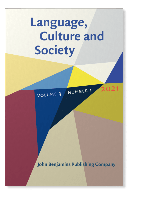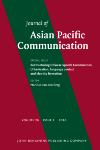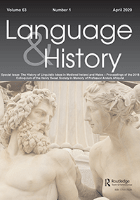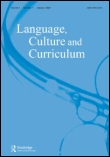
Language-Culture and Society
Scope & Guideline
Unveiling the Dynamics of Communication and Identity
Introduction
Aims and Scopes
- Language Ideologies and Practices:
The journal examines how language ideologies shape social interactions and cultural identities, including the ways in which language is used in various contexts, such as healthcare and education. - Identity Construction:
A significant focus is on how individuals and communities negotiate and construct identities through language, particularly in multicultural and multilingual settings. - Sociolinguistic Analysis:
The journal employs sociolinguistic methodologies to investigate language usage in society, including the impact of social changes on language practices. - Cultural Representation:
It explores the role of language in cultural representation and the mediatization of cultural narratives, assessing how media influences language and identity. - Impact of Globalization:
The impact of globalization on language practices and identity formation is a recurring theme, addressing how global movements affect local language use and cultural expressions.
Trending and Emerging
- Multilingualism and Sensescapes:
There is a growing focus on multilingual environments and how they shape sensory experiences and social interactions, highlighting the complexities of language use in diverse communities. - Health Literacy and Language Ideologies:
Emerging discussions around health literacy reveal how competing language ideologies affect access to healthcare information, spotlighting the intersection of language, culture, and public health. - Chronotopes and Societal Change:
The concept of chronotopes—how time and space influence social interactions—has gained traction, particularly in relation to the COVID-19 pandemic and its effects on community narratives and identities. - Digital Media and Language Practices:
The influence of digital media on language practices and identity construction is increasingly prominent, reflecting how online platforms shape communication and cultural representation. - Racial and Ethnic Identity Narratives:
Research into narratives surrounding racial and ethnic identities, particularly in the context of anti-racism and social movements, is becoming more prevalent, indicating a societal shift towards inclusivity and representation.
Declining or Waning
- Traditional Linguistic Studies:
There has been a noticeable decrease in papers focusing solely on traditional linguistic studies, such as syntax or phonetics, as the journal increasingly emphasizes sociocultural contexts over purely linguistic analysis. - Language Preservation Initiatives:
Research related to language preservation initiatives, particularly in indigenous contexts, appears to be waning, possibly due to a shift towards more contemporary applications of language in dynamic social settings. - Static Cultural Narratives:
The exploration of static cultural narratives, which once dominated discussions, is declining in favor of more dynamic, fluid representations of culture and identity that reflect current societal changes.
Similar Journals

Journal of Asian Pacific Communication
Fostering dialogue on communication practices in a global context.The Journal of Asian Pacific Communication, published by John Benjamins Publishing Co, stands out as a vital resource for researchers and professionals exploring the intricate dynamics of communication within the Asian Pacific region. Established in 2000, this esteemed journal, with the ISSN 0957-6851 and E-ISSN 1569-9838, focuses on interdisciplinary studies that intersect with the fields of business, communication, economics, and geography, as indicated by its Q3 ranking in multiple categories for 2023. The journal facilitates scholarly discourse, making it crucial for understanding regional communication practices and their broader implications. While the journal is not Open Access, it remains a critical source of knowledge for academics, offering comprehensive insights and empirical research that can inform practice and policy. In a rapidly evolving global context, the Journal of Asian Pacific Communication is dedicated to advancing the understanding of communication complexities unique to the Asian Pacific, ensuring its pivotal role in ongoing academic discussions.

Stellenbosch Papers in Linguistics Plus-SPiL Plus
Advancing Linguistic Insight and CollaborationStellenbosch Papers in Linguistics Plus (SPiL Plus), published by the Department of General Linguistics at the University of Stellenbosch, is a prominent open-access journal dedicated to the dissemination of research in the field of linguistics. Established in 1980, SPiL Plus provides a collaborative platform for researchers, professionals, and students worldwide, facilitating the sharing of innovative linguistics research from diverse subfields. With an ISSN of 1726-541X and an E-ISSN of 2224-3380, this journal has secured its place in the academic landscape, despite currently holding a Q4 ranking in Linguistics and Language for 2023. It's ranked 481 out of 1088 in the Scopus metrics for Arts and Humanities and stands at the 55th percentile, confirming its relevance and contribution to the linguistics discourse. The journal aims to foster scholarly exchange and address significant linguistic issues, making it an essential resource for anyone passionate about language and its complexities. Readers can access its articles freely, promoting wider accessibility and engagement with linguistic research from South Africa and beyond.

Language & History
Fostering Dialogue Between Linguistics and HistoryLanguage & History is a distinguished journal published by Routledge Journals, Taylor & Francis Ltd, focusing on the intersection of linguistics and historical context. With an ISSN of 1759-7536 and an E-ISSN of 1759-7544, this journal serves as a vital platform for scholars exploring the dynamic relationship between language evolution and historical narratives. It is recognized for its contributions to the field, holding a Q2 ranking in Linguistics and Language for 2023, reflecting its esteemed position among peer publications. Indexed in Scopus with notable rankings in both Arts and Humanities and Social Sciences, Language & History aims to foster innovative research, shed light on language change, and encourage cross-disciplinary dialogue. The journal operates without open access, providing rigorous peer-reviewed content for researchers, professionals, and students alike, ensuring that cutting-edge studies remain at the forefront of linguistic research. Published biannually, it continues to attract a diverse array of contributions that enrich the understanding of language within historical contexts, making it an essential resource in the academic community.

Language Culture and Curriculum
Advancing Language Education Through Cultural InsightsLanguage Culture and Curriculum is a premier academic journal published by Routledge Journals, Taylor & Francis Ltd, dedicated to advancing knowledge in the fields of Education and Linguistics. With a distinguished history since 1988 and converging through to 2024, this journal is highly regarded, reflecting its exemplary standing with a 2023 Q1 ranking in both Education and Linguistics. Currently among the top 3% of publications in Language and Linguistics and ranked 27th in Social Sciences, Language Culture and Curriculum fosters the exploration of language education within diverse cultural contexts. Through rigorous peer-reviewed research, it serves as an essential platform for researchers, educators, and policymakers alike, promoting innovative practices and theoretical frameworks in language teaching and curriculum development. Although it does not offer Open Access, the journal remains an invaluable resource in academic circles, supporting scholarly discourse and advancing educational methodologies.

Euskera
Promoting Vibrant Discourse on Basque Identity and LanguageEuskera is a distinguished academic journal dedicated to the study and promotion of the Basque language and culture, published by EUSKALTZAINDIA, the Royal Academy of the Basque Language. With the ISSN 0210-1564, this journal serves as a pivotal platform for researchers, linguists, and cultural scholars to disseminate cutting-edge research and discussions focused on linguistics, language preservation, and Basque identity. Although the journal is not classified as Open Access, it provides comprehensive insights into the advancement of Basque studies and contributes significantly to the field’s academic discourse. Aimed at fostering a deeper understanding and appreciation of the linguistic and cultural heritage of the Basque people, Euskera plays an invaluable role in connecting scholars and practitioners, promoting vibrant scholarly exchanges that enrich both local and global perspectives.

Heritage Language Journal
Championing the Study of Multicultural LinguisticsThe Heritage Language Journal is an esteemed publication dedicated to the field of heritage language studies, providing a platform for advanced research and discussions surrounding bilingualism, language maintenance, and cultural identity. Published by BRILL, a recognized leader in academic publishing, this journal aims to bridge the gap between theory and practice, offering insightful articles, empirical studies, and critical reviews that advance understanding of how heritage languages influence personal and community identity. With an ISSN of 1550-7076, the journal serves as an essential resource for researchers, professionals, and students engaged in linguistics, sociolinguistics, and multicultural studies. Although currently not an open-access journal, it maintains rigorous academic standards and is committed to fostering an inclusive dialogue on heritage languages worldwide. Additionally, by contributing to the ongoing discourse in this vital area of study, the Heritage Language Journal plays a significant role in preserving linguistic diversity and cultural heritage.

FRANCAIS MODERNE
Delving into the Vibrant World of Modern Francophone DiscourseFRANCAIS MODERNE, published by the CONSEIL INT LANGUE FRANCAISE, occupies a significant space in the field of French language and literature studies. With an established ISSN of 0015-9409, this journal has contributed to the scholarly discourse from 2002 to 2012, offering a curated platform for researchers and academics to explore contemporary issues, linguistic developments, and literary analyses within the Francophone world. Although its coverage in databases such as Scopus has been discontinued, the journal remains a valuable resource for those dedicated to understanding the nuances of modern French literature and language. While FRANCAIS MODERNE does not provide open access options, it is recognized for its commitment to fostering academic research, making it an essential reference point for professionals and students alike who seek to deepen their knowledge in this vibrant field.

Ethnorema
Enriching understanding of cultural dynamics in a global context.Ethnorema is a distinguished, peer-reviewed journal dedicated to the field of ethnography and cultural studies. Published by ETHNOREMA ASSOC since 2005, this Open Access journal has been instrumental in fostering scholarly dialogue and disseminating significant research in the study of diverse cultures and social practices. With an ISSN of 1826-8803, Ethnorema provides a vital platform for researchers, professionals, and students alike to engage with contemporary ethnographic studies and interdisciplinary approaches. The journal not only champions rigorous academic contributions but also emphasizes accessibility, ensuring that its content reaches a global audience. Located in Castelnuovo Scrivia, Italy, Ethnorema is committed to enriching the understanding of cultural dynamics and societal transformations through impactful research. As a resource that caters to an array of academic inquiries, it holds a crucial role in shaping the discourse within the humanities and social sciences.

Eurasian Journal of Applied Linguistics
Innovating Language Education Across EurasiaThe Eurasian Journal of Applied Linguistics, published by Hacettepe University, ELT Department, is a distinguished open-access journal that has been contributing to the fields of linguistics and language education since 2015. With a focus on bridging cultural and linguistic understandings across Eurasia, this journal provides a platform for researchers, educators, and practitioners to share cutting-edge studies, innovative pedagogical strategies, and insightful analyses. The journal holds notable Scopus rankings within the Language and Linguistics (Rank #155/1088, 85th Percentile) and Education (Rank #696/1543, 54th Percentile) categories, evidencing its growing impact within the academic community. As it prepares to converge into a new phase from 2018 to 2024, the Eurasian Journal of Applied Linguistics aims to uphold its mission of fostering interdisciplinary dialogue and advancing knowledge in applied linguistics and its related fields.

REVISTA DE FILOLOGIA DE LA UNIVERSIDAD DE LA LAGUNA
Cultivating knowledge and dialogue in the realm of philology.REVISTA DE FILOLOGIA DE LA UNIVERSIDAD DE LA LAGUNA is a prestigious academic journal dedicated to advancing the fields of linguistics and language studies. Published by the Universidad de la Laguna in Spain, this journal serves as an essential resource for researchers, professionals, and students alike, offering critical insights and scholarly articles that contribute to the understanding of language and its intricacies. With its inclusion in the Q3 category of the 2023 Linguistics and Language rankings and Scopus rankings, it demonstrates a growing impact within the academic community, while maintaining a commitment to fostering dialogue and disseminating valuable research. As a platform for innovative ideas and diverse perspectives, the journal aims to bridge theoretical approaches and practical applications, ensuring that readers are well-equipped to engage with contemporary issues in linguistics. Although it is currently not open access, the journal remains an influential contributor to the language and linguistics sectors, operating from the picturesque Canary Islands, enhancing its appeal not only as a scholarly resource but also as a culturally rich platform for academic expression.